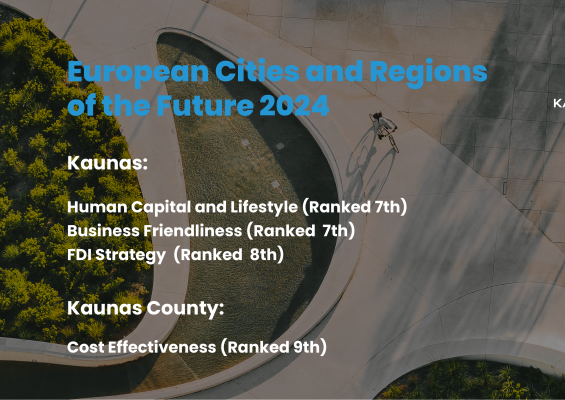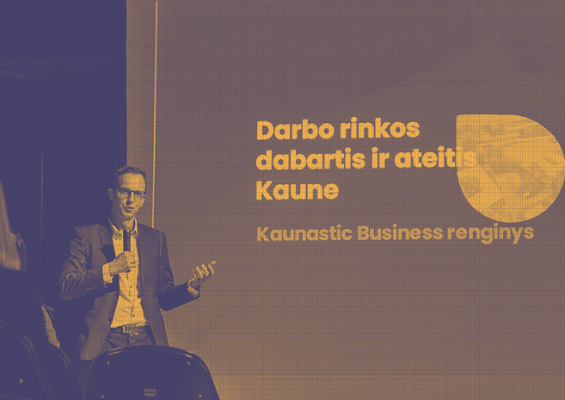Pienas LT factory – the largest milk producers’ cooperative in the Baltic states – which began its operations in Kaunas FEZ 6 years ago, is steadily increasing its processing capacity and is forecasting a year of record revenue. The company, which unites 213 milk producers from all of Lithuania, exports almost all of the factory’s production to more than 50 countries around the world. One of its biggest challenges and strategic goals is to improve the situation of milk producers and increase the amount of milk produced.
The operating model of the cooperative, which was founded back in 2008, was inspired by examples of good practice from around the world, such milk producer cooperatives as the New Zealand corporation Fonterra or Finland’s largest milk processing company Valio. The main idea is, the more supply chains an integration covers, the more efficient it is, theoretically, and the more benefits it generates. According to Mantas Rudaitis, CEO of Pienas LT, the long-term experience of foreign cooperations and the level of development of cooperatives have shown that such a principle works perfectly. Currently, Pienas LT unites 213 Lithuanian milk producers, who are also the owners of the factory operating in the territory of Kaunas FEZ, and all the most important decisions for the cooperative are made at the general meetings by members themselves.
Meanwhile, the company itself currently has over 200 employees: most of them work in the production departments and the laboratory, and a quarter of them are milk truck drivers.
“The technological equipment used in our company is automated, so working with it requires highly qualified employees, most of whom we have to train because there are usually no trained employees on the market. We are glad that the turnover of employees in the company is low, and we try not only to create good working conditions, but also a good atmosphere. We believe that this will not only allow us to preserve our current team, but also help to expand it as the company’s activities expand,” M. Rudaitis says.
Decisive arguments: employees, communication, infrastructure
The possibility of attracting the necessary specialists in the food industry was one of the factors that led to the cooperative’s decision to set up its factory in the Kaunas FEZ territory several years ago. The necessary specialists in Kaunas are trained by KTU Department of Food Science and Technology, LSMU (food safety and quality studies), VMU Agriculture Academy and several colleges. Two other important arguments for choosing Kaunas were convenient communication and the necessary infrastructure for the factory.
We are a Lithuanian cooperative company that unites members from various regions, so the distance to milk producers is very important to us for the transportation of raw materials. Kaunas is in the center of Lithuania, where all the main road arteries intersect, so it is a perfect location for us. Another criterion that led to our decision was the fact that our technological process requires high-capacity infrastructural inputs: electricity, gas, water and sewage, which we found in the Kaunas FEZ. Not all the free economic zones can provide it. And, of course, our green field investment amounted to 40 million euro and the annual turnover of the company was anticipated to be large, so the economic benefits provided by the FEZ became an additional incentive,” the company’s CEO presents the arguments.
Production based on high technologies
Currently, it is one of the most modern milk processing plants not only in the country, but also in the region. The range of products is determined both by the technology of the factory itself and by the changing needs of consumers. However, as the CEO emphasizes, the production differs from the widespread skimmed milk powder. “We are a highly specialized manufacturer of milk ingredients. We produce purified and concentrated milk protein powder. Therefore, our products are high-concentration milk protein, micellar casein, whey protein isolate powder and liquid cream. In addition, the recent trends pushed us into producing organic products and lactose-free milk protein powder as well.”
The geography of Pienas LT’s product sales is particularly broad. Only 2 percent of production per year remain in Lithuania, the rest travels to more than 50 countries worldwide. Most of it goes to the Western European countries: Germany, Italy, Holland, and the other part goes outside the European Union to Morocco, Bahrain, Saudi Arabia, Brazil, and Nigeria. Buyers are from the food industry, including both medium and large international companies that manage world-famous brands.
Pienas LT cooperative was the first dairy product producer in Lithuania to receive the Japanese Agricultural Standards certificate, opening the way to sell organic products on the Japanese market.
Interestingly, the company’s sales and production capacity were not affected by the pandemic or the unrest caused by the war: high value-added milk ingredients were and are needed in the food industry.
“I think the fact that we are in the food industry has made it possible to avoid problems and even increase the income of milk processing and sales. In 2020, our turnover grew by about 12 percent, in 2021 we grew by another 20 percent, and this year, it seems, will also be a record year for our sales revenue. Compared to 2021 it will increase by another 30 percent, i.e., will amount to more than 120 million euro,” the CEO says. According to him, that progress is also promoted by healthy competition. “I have no doubt that the establishment of the Pienas LT cooperative contributed to the pricing of raw milk, which is beneficial to the country’s farms. The change in the raw milk price increased by 78 percent in a year. This is how we rose from being at the bottom in the European Union to the leaders.”
Investing in R&D activities
Growing production and returns also increased opportunities for investment. Over the past few years, Pienas LT invested in improving the company’s processes, increasing the productivity of technologies and liquid mixing equipment, thus expanding its range of products. Milk truck park is being constantly renovated, the company’s information systems are being developed, and at the end of this year it is planned to purchase dry mixing equipment, which will allow the expansion of the factory’s product range with functional mixes.
Although the dairy industry in general is quite inert in the implementation of innovations, and any change in technology requires significant investment and time, Pienas LT factory has a Research and Development department engaged in work related to the use of products, improvement and development of new products. Considerable experience has been accumulated in cooperation in the field of R&D (scientific research, experimental development and innovation) with Lithuanian and foreign universities and consulting companies. According to the director, since the beginning of the plant’s operation, the cooperative has spent about 2 million euro on R&D activities and part of the results of these activities are already implemented in production processes and provide economic benefits.
Among the goals and challenges are the green course and the promotion of dairy farming
One of the strategic goals of Pienas LT is to be environmentally friendly and develop a sustainable business. Already during the construction of the factory, solutions were implemented that allow the use of a smaller amount of water for washing the recycling systems. In subsequent years, improvements were introduced to save electricity and gas. The nearest planned green course project at the factory is a solar power plant.
When asked what challenges are the most relevant for the cooperative and the factory at the moment, M. Rudaitis first names the amount of milk produced in the Baltic region, “Taking into account the changing habits of consumers and statistics, we see that the growth of the consumption of dairy products is perhaps the most stable, compared to the growth of other protein sources, so currently, we are focusing on improving the situation of Lithuanian milk producers, hoping that the amount of milk produced in Lithuania will increase in the next decade. We have many plans, but whether the investments in new equipment will be fully utilized and how long it will take to pay off, will depend on the supply of raw materials.”



